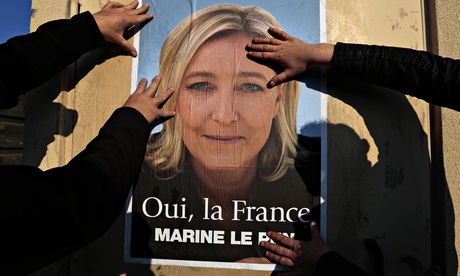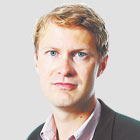Moscow is handing cash to the Front National and others in order to exploit popular dissent against the European Union

It sounds like a chapter from a cheesy spy novel: former KGB agent, chucked out of Britain in the 80s, lends a large sum of money to a far-right European party. His goal? To undermine the European Union and consolidate ties between Moscow and the future possible leader of pro-Kremlin France.
In fact this is exactly what’s just happened. The founder of the Front National (FN), Jean-Marie Le Pen, borrowed €2m from a Cyprus-based company, Veronisa Holdings,owned by a flamboyant character and cold war operative called Yuri Kudimov.
Kudimov is a former KGB agent turned banker with close links to the Kremlin and the network of big money around it. Back in 1985 Kudimov was based in London. His cover story was that he was a journalist working for a Soviet newspaper; in 1985 the Thatcher government expelled him for alleged spying. (During the same period Vladimir Putin was a KGB officer in Dresden.)
In Paris, the FN confirmed last week that it had taken a whopping €9.4m (£7.4m) loan from the First Czech Russian bank in Moscow. This loan is logical enough. The FN’s leader, Marine Le Pen, makes no secret of her admiration for Putin; her party has links to senior Kremlin figures including Dmitry Rogozin, now Russia’s deputy prime minister, who in 2005 ran an anti-immigrant campaign under the slogan “Clean Up Moscow’s Trash”. Le Pen defended her decision to take the Kremlin money, complaining that she had been refused her access to capital: “What is scandalous here is that the French banks are not lending.” She also denied reports by the news website Mediapart, which broke the story, that the €9.4m was merely the first instalment of a bigger €40m loan.
The Russian money will fuel Marine Le Pen’s run for the French presidency in two years’ time. Nobody expects her to win, but the FN topped the polls in May’s European elections, winning an unprecedented 25% of the vote; Le Pen’s 25 new MEPs already form a pro-Russian bloc inside the European parliament.
In part, the Moscow loan can be understood as an act of minor and demonstrative revenge. It follows President François Hollande’s decision to postpone the delivery to Moscow of the first of two Mistral helicopter carriers, in a deal worth €1.2bn. His U-turn follows considerable western pressure, in the wake of Russia’s annexation of Crimea and its ongoing covert invasion of eastern Ukraine.
But there is also a more profound and sinister aspect to the Moscow cheque. Since at least 2009 Russia has actively cultivated links with the far right in eastern Europe. It has established ties with Hungary’s Jobbik, Slovakia’s far-right People’s party and Bulgaria’s nationalist, anti-EU Attack movement. Here, political elites have become increasingly sympathetic to pro-Putin views.
According to Political Capital, a Budapest-based research institute which first observed this trend, the Kremlin has recently been wooing the far-right in western Europe as well. In a report in March it argued that Russian influence in the affairs of the far right is now a “phenomenon seen all over Europe”. Moscow’s goal is to promote its economic and political interests – and in particular to ensure the EU remains heavily dependent on Russian gas.
In Soviet times the KGB used “active measures” to sponsor front organisations in the west including pro-Moscow communist parties. The Kremlin didn’t invent Europe’s far-right parties. But in an analogous way Moscow is now lending them support, political and financial, thereby boosting European neo-fascism.
In part this kinship is about ideology or, as Political Capital puts it, “post-communist neo-conservatism”. The European far right and the Kremlin are united by their hostility to the EU. Since becoming president for the third time in 2012, Putin has been busy promoting his vision for a rival Eurasian Union. This is an alternative political bloc meant to encompass now-independent Soviet republics, with Moscow rather than Brussels as the dominant pole.
The Kremlin has also discovered that the western political system is weak, permeable and susceptible to foreign cash. Putin has always believed that European politicians, like Russian ones, can be bought if the money is right. According to US diplomatic cables leaked in 2010, Silvio Berlusconi has benefited “personally and handsomely” from energy deals with Russia; the former German chancellor Gerhard Schröder, Putin’s greatest European ally, sits on the board of the Nord Steam Russian-German gas pipeline.
Far-right and rightwing British politicians, meanwhile, have also expressed their admiration for Russia’s ex-KGB president. In March Nigel Farage named Putin as the world leader he most admires, and praised the “brilliant” way “he handled the whole Syria thing”. In 2011 the BNP’s Nick Griffin went to Moscow to observe Russia’s Duma election. Afterwards he announced that “Russian elections are much fairer than Britain’s”. Last week Griffin tweeted praise for Russia Today, the Kremlin’s English-language TV propaganda news channel: “RT – For People Who Want the Truth”.
There are many ironies here. In his state of the nation address last Friday, Putin implicitly compared the west to Hitler, and said it was plotting Russia’s dismemberment and collapse. In March Putin defended his land-grab in Crimea by arguing he was rescuing the peninsula from Ukrainian “fascists”. A few weeks later a motley group of radical rightwing European populists turned up in Crimea to watch its hastily arranged “referendum”.
Tactically, Russia is exploiting the popular dissent against the EU – fuelled by both immigration and austerity. But as rightwing movements grow in influence across the continent, Europe must wake up to their insidious means of funding, or risk seeing its own institutions subverted.

No comments:
Post a Comment